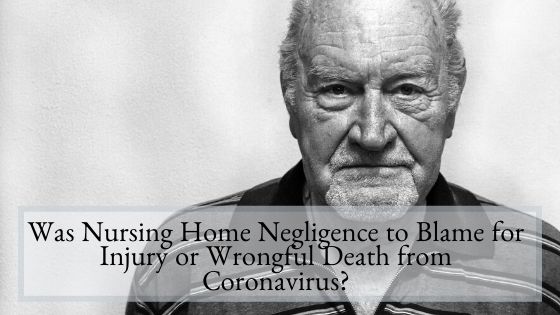COVID-19 or Coronavirus is a particularly ruthless respiratory disease with an overall mortality rate more than 3 times higher than the seasonal flu. For senior citizens and nursing home residents it can be particularly dangerous since they are at a higher risk of dying due to the virus. Add in factors like living in close quarters, residents’ underlying health conditions, and the documented, widespread failures of the majority of nursing homes to adequately prevent and control infections, and it becomes clear why nursing homes can be dangerous for those at risk. When coronavirus does spread through a nursing home, most of the time it is due to negligence of the nursing home staff. If you believe that an elderly loved one has died in a nursing home due to COVID-19 because of the negligence from the nursing home and its staff then you should contact an experienced wrongful death attorney, who can assist you in finding justice and answers.
Why are Nursing Homes at such High Risk for the Spreading of COVID-19?
The news media has reported numerous circumstances in which nursing homes have allowed employees and other members of the public to come in contact with nursing home residents. These such contacts have likely caused infections of additional people in the nursing home. As a result of this the nursing home environment has become a death trap. The captive residents of nursing homes have effectively become victims of this negligence. The following are ways in which to identify the most likely indicators of such negligence. For instances:
- Nursing home employees that exhibit symptoms of coronavirus or have been exposed to other people who have coronavirus, and the nursing home has failed to identify these people or has failed to keep them away from nursing home residents.
- Visitors that have exhibited symptoms of coronavirus or have been exposed to other people who have coronavirus, and the nursing home has failed to identify these people or has failed to keep them away from nursing home residents.
- Nursing home residents that exhibit symptoms of coronavirus or have been exposed to other people who have coronavirus, and the nursing home has failed to identify these people or has failed to keep them away from nursing home residents.
- Nursing homes have failed to test employees for coronavirus, especially those employees that have exhibited symptoms of coronavirus. Or nursing homes have failed to test employees for coronavirus, who have been in contact with others that are diagnosed with coronavirus.
- Nursing homes have failed to provide protective equipment and properly train on how to use this protective equipment
- Nursing homes have failed to provide proper training for their employees on how to prevent the spread of coronavirus.
- Nursing homes have failed to institute safe visitation rules and regulations, including self distancing and stricter restrictions on visitation.
The risk of infection is highest in people over age 65. According to the CDC, the fatality rate is highest for patients 85 and older, ranging from 10% to 27%, and 3% to 11% for those 65 to 84. Older Texans with pre-existing illnesses are at an even higher risk of fatality.
There’s evidence many care facilities aren’t following CDC guidelines or taking precautions that would be considered reasonable measures to prevent infection. Frequent hand washing, avoiding close contact, and disinfecting surfaces can help prevent transmission of coronavirus. Nursing home staff can wipe down chairs and tables, and wear protective gear such as masks and gloves, to keep each nursing home resident as safe as possible. If you believe that the nursing home that your loved one passed away in was not taking the necessary precautions to protect its residents from coronavirus then you need to speak with an experienced wrongful death attorney.
Do Nursing Homes Have a Duty to Protect Their Residents from COVID-19?
Nursing homes have a duty of care to protect their residents. By law, they must follow an Infection Control Program that includes steps to investigate, control, and prevent infections; isolate carriers, and maintain detailed records of infections and preventative measures taken.
If a loved one has become infected, you should contact a personal injury lawyer who will get a copy of the nursing home’s infection control record. They’ll also look at whether COVID-19 cases were reported to health authorities. In comparing the response to the applicable standard of care, an attorney can determine whether the facility or a staff member is liable for negligence.
Should You File a Wrongful Death Case Due to Nursing Home Negligence?
Sadly, nursing home negligence is nothing new. A nursing home lawsuit can be filed to seek damages for elder abuse, prescription drug injuries, and conditions associated with being exposed to and infected by COVID-19. Residents continue to wrongfully die when infection could have easily been prevented. You can sue and possibly receive settlement funds if a loved one was treated for coronavirus; the money can be used to pay for medical care and compensate for other damages related to your personal injury claim, such as pain and suffering, emotional distress, and wrongful death. An experienced wrongful death attorney can assist you in getting the answers and justice you deserve for your loved ones fatality.
If you need a wrongful death attorney, then you should call our law offices today at any of our convenient locations and get a free consultation.
Arlington (817) 522-4451
Dallas (972) 362-6848
Fort Worth (817) 764-1375
Plano (972) 354-4602
Cedar Hill (972) 338-9427
McKinney (469) 522-3688
Lewisville (972) 354-4605
Frisco (972) 725-7681
Grapevine (817) 835-8677
Irving (972) 354-4610
Keller (817) 204-0904
Garland (214) 572-2251
Denton (940) 222-4060
Addison (972) 564-8108
You can also contact us online by using our quick contact form.











